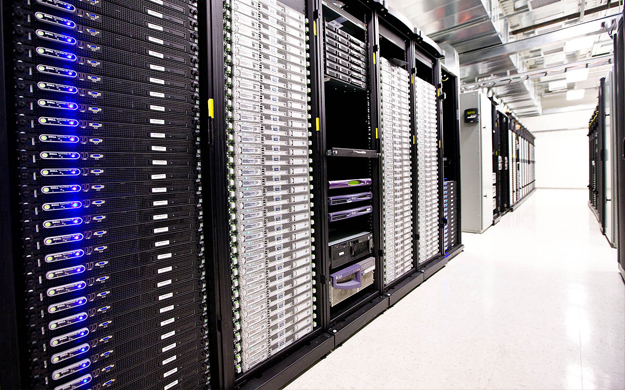Tax cuts for $5B data center in Michigan sought
LANSING — A tax-relief plan to help turn a vacant corporate headquarters outside Grand Rapids into the largest data center in the eastern half of the U.S. received its first public airing Tuesday as legislative supporters amended the terms to build support.
Backers of the plan say the proposed $5-billion data center by the technology company Switch could be transforming for Michigan’s economy, putting the state on par with other states benefiting from cutting-edge technology investments.
However, Gov. Rick Snyder said Tuesday that he still has some unanswered questions about the impact of the proposed data center and the tax breaks associated with them.
“It’s not a quick yes or no answer,” the governor told reporters after a Michigan Farm Bureau meeting. “There are a lot of policy implications of doing this.”
He added that he thought the change in tax policy needed to be approached with care.
“You want to make sure it’s a real project that results in real jobs,” Snyder said.
He said the Switch project could be welcomed if it lived up to its billing.
“Just a data center by itself is not a huge job generator. It’s a huge data center. The question is, ‘Is there more value-added work that will be taking place at that facility that will lead to much more employment?'” the governor said.
A new analysis from the state’s nonpartisan House Fiscal Agency on Tuesday also raised questions about the uncertain cost. The report found it was still unclear how much the state might miss out on if Switch’s data center is freed from paying a variety of state taxes as proposed.
Skeptics began to surface Tuesday. State Rep. Jim Townsend, D-Royal Oak, questioned whether Michigan policymakers wanted to turn the state into a place like Nevada, Switch’s home state with a higher unemployment rate than Michigan where the tech company has been offered similar tax breaks.
But with backing from a number of legislators and economic development officials from western Michigan, the proposed tax break could come up for a vote before the end of the year.
“We want to have a very open discussion because when someone is talking about investing $5 billion in your state, it’s kind of a big deal,” Senate Majority Leader Arlan Meekhof, R-West Olive, told reporters on Tuesday.
The Senate’s top leader said that the Legislature should, if possible, avoid picking specific winners through its tax policy. “We spent a long time trying not to do that, so I would say a broad-based tax policy is probably the best,” he said.
Originally, legislative sponsors sought sales, property and use tax exemptions for the Nevada-based data company Switch to lure its proposed SUPERNAP campus to Michigan. The company has similar facilities in Reno and Las Vegas serving the western part of the country.
Falling in love with Grand Rapids:
States have vied to lure such centers, but there has been an ongoing debate about whether the economic incentives end up paying off with enough new jobs and greater economic activity,
Jason Mendenhall, executive vice president of cloud at SUPERNAP, a Switch company, said during the Tuesday legislative hearing that Michigan had not been under serious consideration until Switch’s chief executive heard from the owner of the empty former Steelcase “pyramid” building outside Grand Rapids.
“We fell in love with Grand Rapids,” Mendenhall said. “We fell in love with Michigan.”
Still, he said, Michigan must present a tax structure friendly for data centers if it hopes to win over Switch.
The Michigan center under Switch’s plan would become home to the company’s 2-million-square-foot data center campus employing as many as 1,000 workers either directly or indirectly. The construction budget on site could be as high as $400 million, according to Mendenhall.
Up to 500 would work directly for Switch, according to Mendenhall. Its clients are expected to “co-locate” hundreds more working there who could be drawn from elsewhere and may or may not end up being based in Michigan.
It would serve as a central hub to store and process data for some of the nation’s biggest users of the Internet, according to officials.
Tax bill amended:
On Tuesday, the tax relief plan was amended in several ways in an apparent move to build more support among legislators.
Changes in the bills include expanding the tax breaks to all third-party data centers in the state. The breaks would end after 20 years and require customers of Switch operating at the data center to have their businesses co-located in the state.
“This is a unique opportunity for Michigan,” state Rep. Rob VerHeulen, R-Walker, one of the sponsors of the bill package, said Tuesday before the Michigan House of Representatives tax policy committee.
The committee took testimony for about an hour Tuesday afternoon but did not vote on the measures.
During the hearing, VerHeulen called on his fellow legislators to support the tax relief because the lost revenue is something Michigan would never collect “if the company goes to another state.” Michigan, he said, must be competitive with other states that offer similar tax breaks.
“By cutting taxes, I believe the result will be more investment and jobs for Michigan residents,” VerHeulen said.
He insisted the bills were not similar to the so-called MEGA tax break program that caught state officials by surprise and could end up costing the state an estimated $9.38 billion, a bill much higher than many legislators originally anticipated.
Contracts were signed for those tax credits for several years before the program ended in 2011. But the bills are still coming due.
The Michigan Economic Development Corp., which oversaw the tax incentive program, has predicted that 80% to 100% of those credits — a large portion earmarked for the auto industry — will be redeemed by the companies that got them.
Critics say those large employers cashing in credits secured years ago and meant to spur investment and job creation helped punch an unexpected $325-million hole in the state budget earlier this year. The state recently amended its MEGA contracts with Fiat Chrysler Automobiles and Ford Motor Co. in an effort to cap the liability and restrict when a company can cash in the tax credits to allow for better budget planning.
Steve Arwood, head of the MEDC, confirmed through a spokeswoman that the state is in negotiations with General Motors Co. to secure a similar agreement.
On Tuesday, some legislators sought to distance the Switch-related tax-relief package from the MEGA program.
Still, it could also be a challenge for legislators to determine how much the state might be losing if they pass the Switch-related tax bills. The House Fiscal Agency report found the proposed laws would apply to Michigan’s current crop of roughly 40 data centers.
As a result, the state is expected to lose between $20 million and $30 million in tax revenue every year, according to the report. Any cut in sales tax revenue could also ding school funding and state revenue sharing with localities while reduced property tax could reduce other school and library funding.




